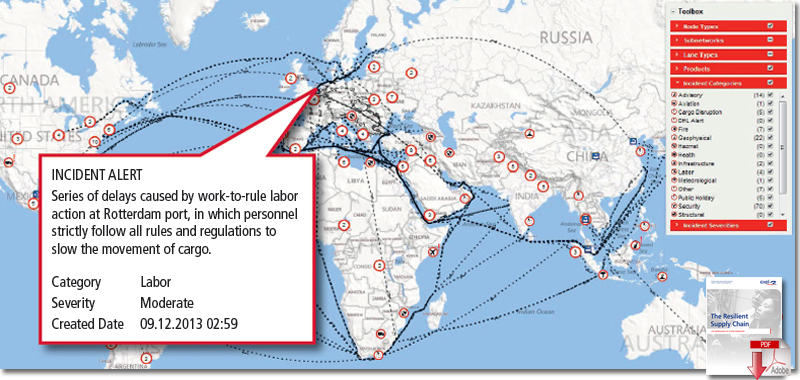Risk Management Solution Highlights Importance of Resilience in International Commerce Supply Chains
Resilience360 will allow customers to assess critical hot spots in their supply chains, visualize them and build a risk profile for initiating potential mitigation activities.
Exel, the North American leader in contract logistics, has partnered with its sister company DHL Supply Chain, the world’s leading logistics company, to launch a new risk management solution.
DHL Resilience360 is a unique tool that enables businesses to turn supply chain disruption and global, environmental and socio-political volatility into a competitive advantage by providing a holistic, end-to-end supply chain view along with real-time risk visibility.
With the support of DHL Resilience360, customers can avoid production stops and lost sales by redirecting resources and adopting alternative strategies when a disruption occurs; considerably supporting their financial stability and potentially capturing sales and market share from their competitors.
The launch comes as findings from Exel’s new white paper “The Resilient Supply Chain,” a report by Lisa Harrington, President of the lharrington group LLC, reveal that companies risk critical damage to their businesses if they don’t build resiliency – rather than just risk management – into their supply chains to address and respond to the driving trends shaping international commerce.
“We understand that supply chains are the lifeblood of our customers’ businesses and we create solutions like DHL Resilience360 to help them meet today’s challenges and anticipate tomorrow’s,” said Bill Meahl, DHL’s Chief Commercial Officer. “Risk can’t be eliminated, but it can be managed to help minimize the negative impact on a business. With the right tools, businesses can even capitalize on disruptions and disasters by having the correct measures in place to respond quickly and effectively when competitors can’t.”
Resilience360: Supply Chain Risk Management

Your supply chain is visualized in your personal dashboard so you can monitor incidents and relevant risk warnings in near real time
Highlights from the white paper include four identified trends: consumerism and boundary bleed; an increasingly fast and interconnected global marketplace; rapidly emerging markets; and the rise of regionalism – which indicate that volatility has emerged as a systemic condition rather than a discrete event at a fixed period and point in time. This exposes just-in-time (JIT), lean and other formerly acknowledged ‘best practice’ supply chain models, prized for their efficiency, as now too brittle and high risk. It proposes a new ‘fast, lean and resilient’ hybrid supply chain that evolves beyond sequential identification and management of operational risks to account for systemic risk.
The white paper includes the ‘Resilience Index’ which indexes five industry sectors – Technology, Automotive, Consumer Goods and Retail, Life Sciences and Healthcare, and Engineering and Industrial – and ranks them in order of resilience maturity. The index reveals that the Technology and Automotive sectors are operating the most mature and therefore profitable supply chains, followed by the Consumer Goods and Retail Sector, while the Life Sciences and Healthcare, and Engineering and Manufacturing sectors are currently lagging behind in their ability to build, operate and sustain a resilient supply chain.
“We believe that ignoring supply chain unpredictability and vulnerability is putting a company at critical risk to their bottom lines, and shareholder or customer confidence,” said Joe Puleo, Senior Vice President Business Development, Exel. “Building cost-effective flexibility and contingency into supply chains will allow companies to quickly respond, redirect resources and adopt alternative strategies when a disruption occurs. This also presents an opportunity to capture sales and market share from competitor companies suffering from the same disruptions.”
DHL Resilience360 will allow customers to assess critical hot spots in their supply chains, visualize them and build a risk profile for initiating potential mitigation activities. The tool links information on natural disasters, theft, geopolitical and other risks with a customer’s global manufacturing and distribution footprint, and is established on the basis of the four critical aspects of supply chain risk – operations, hazards, socio-political and natural disaster risks.
Having mapped the entire supply chain of a customer, the tool provides real-time visibility of risks by working collaboratively with partners to provide options for immediate recovery.












